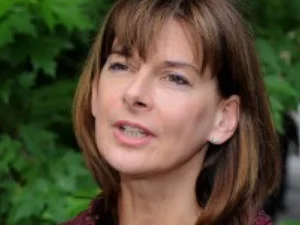June 13th, 2022
ELF professional member profile - Carol Day
For this latest profile we have asked one of our own Trustees, and internationally respected lawyer, Carol Day to answer a few questions. We knew Carol would have interesting and insightful things to say about the state of nature, environmental laws and access to justice. All subjects very close to ELF’s heart. So we were delighted when she said yes. Carol was recently named in the ENDS power list as one of the 100 most influential players in the UK environmental landscape and we would attest to that. Always at the forefront of environmental action, as a successful lawyer at Leigh Day acting for the likes of Wild Justice, in her knowledge and experience of the Aarhus Convention, her long running association with the RSPB, ELF is proud that Carol gives time to ELF as well.

How would you describe yourself in 3 words?
Tenacious, shy, committed.
How long have you been associated with ELF and do you remember an ELF case that was of particular interest?
I’m the newest member of the Board so I’ve only formally been associated with ELF for two years - although I remember working on ELF cases when I was trainee solicitor. It’s the breadth of ELF cases that attracts me to the organisation. Some enquiries go all the way to court, while others are resolved fairly swiftly. But in all of those cases there’s a concerned community that needs help and ELF is often their first and only point of call. That’s a privilege and a responsibility and I think ELF and its network of lawyers do an amazing job.
You started off your career working within conservation? Do you think that has given you a deeper understanding of the environmental issues?
Definitely. Spending six weeks raking Ufton Fields hay meadow and a couple of years pollarding willows and laying hedges in my 20s gave me an appreciation of the relationship between nature and land management. I then spent the rest of my 20s and 30s working as a campaigner with The Wildlife Trusts and then WWF – lobbying Government and running campaigns. I particularly remember working on the adoption of the Habitats Directive, its transposition into UK law and the identification of European sites. The Birds and Habitats Directive are the cornerstone of conservation legislation in the UK – it is breaking my heart to see this Government dismantling it.
Essentially, I think having a background in conservation policy and the NGO movement helps me understand what individuals and groups are trying to achieve and then work out how the law can help.
What area of environmental law particularly interests you and why?
I am passionate about two areas: nature conservation and access to justice. I am a keen birder, but I love all forms of wildlife, and while the environmental cases Leigh Day brings are all important, I am happiest working on biodiversity cases.
I also feel that everyone should have the right to go to court and challenge the Government when they believe it has acted unlawfully. So, I’m an ardent supporter of an obscure piece of UN law called the Aarhus Convention, which is basically concerned with environmental rights – our right to know, to participate and to challenge. I’m extremely fortunate that the RSPB recognises the wider importance of those rights and funds me to work with other NGOs to protect them. I wasn’t terribly thrilled the other day when someone referred to me as the “Grandmother of Aarhus” though, but I’m trying to take it as a compliment.
In terms of public speaking what was the most nerve racking appearance you have undertaken?
All of them. I’ve done a lot of public speaking over the last thirty years and the fear has never left me – I’m in awe of barristers! My husband can get up and speak authoritatively without a single note. Even now I have to practice, I don’t sleep beforehand and I have prompt cards in case my mind goes blank.
If you could change one area of the law on nature, what would it be?
I am a fan of rights for nature, but sadly our courts aren’t ready for it – you only have to look at where we are with climate litigation. A decade from now, I fervently hope the climate cases we’re bringing now will be regarded as mainstream. In the meantime I have huge admiration for individuals like Sarah Finch, who took her case on downstream emissions all the way to the Court of Appeal and achieved real change, with all the stress and risk involved.
The other law I would introduce is an Environmental Rights Act in the hope that we could protect the process of judicial review from death by a thousand cuts and prevent pivotal processes like EIA and SEA from being undermined.
The UK is among the 10% of the least biodiverse places on the planet. Do you think that with the environmental laws we have in place and the Government’s stated ambition in the 25 Year Environment Plan to “leave the natural environment in a better state than it found it” we can reverse the decline in nature in the UK.
Nature is incredibly resilient and can recover if given the chance. Twenty years ago there were very few Buzzards and Red Kites in the skies over England but, despite ongoing illegal persecution, they’ve managed to make a significant recovery. For that to happen across the whole spectrum, it’s quite simple - we need to stop the dismantling of our regulatory regime, set ambitious but achievable targets in law and incentivise their recovery.
If you could pass on advice to new aspiring environmental lawyers, what would it be?
Never give up. In the words of Desmond Dekker – you can get it if you really want!
